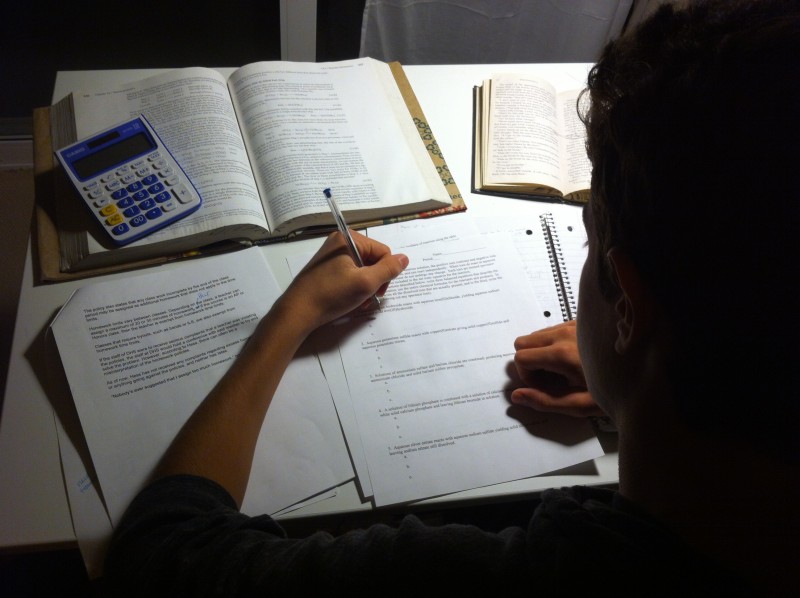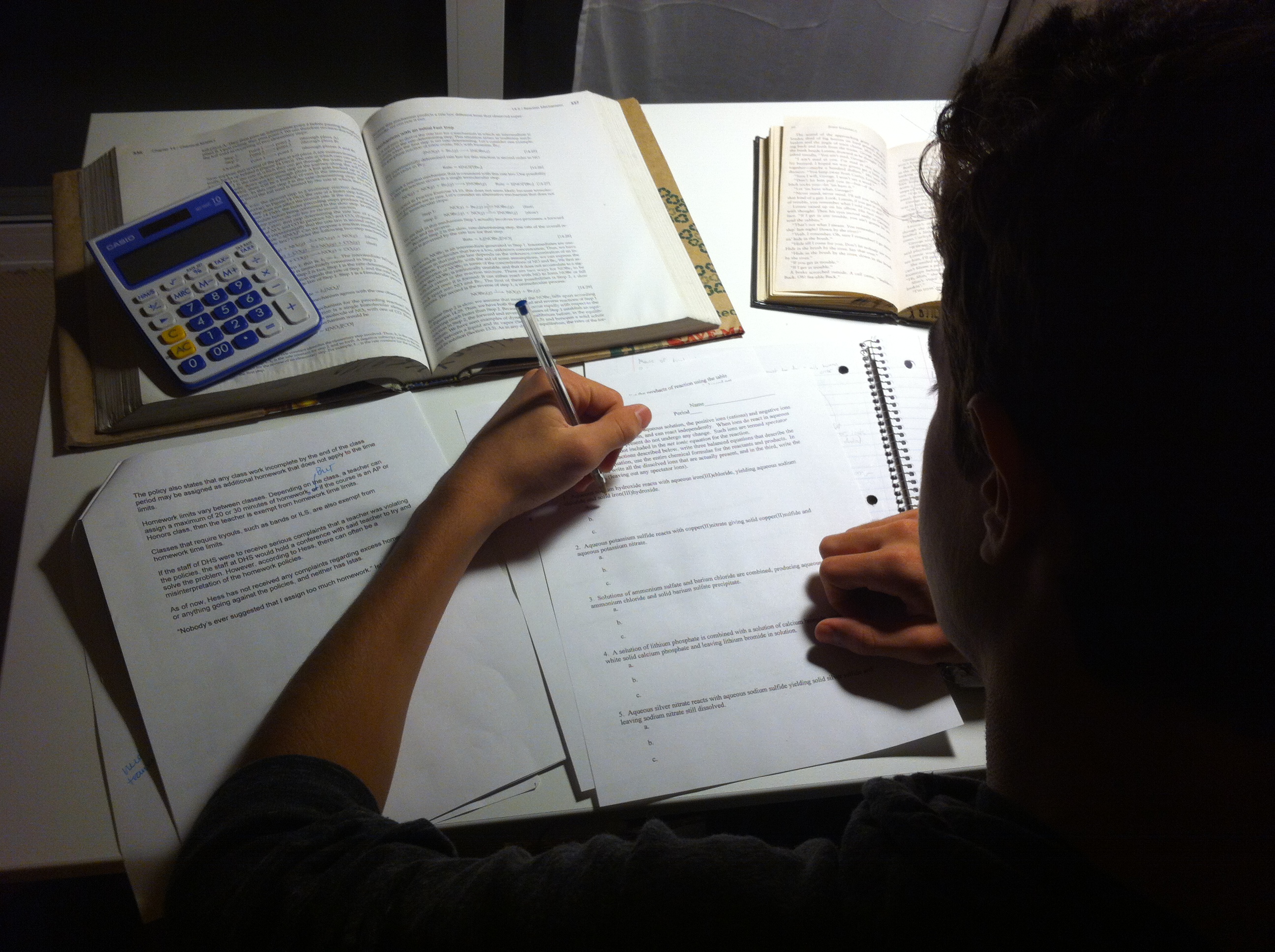Investigating school policies

By Bernardo Verdiguel, Yuliya Monastyrska and Claire Broaddus,
Bluedevilhub.com Staff–
Many different school policies are outlined in the school planner, while others are unwritten or unclear. How do different teachers and students think enforcement of policies compare to the procedures that have been put in place? Take a look at more school policies in the Nov. 6 print edition of The HUB.
Homework policies disregarded
The homework policies at Davis High are in place in order to attempt to limit the workload students receive. However, some students believe more could be done.
“It’s subjective—the endeavor is to keep homework at a minimum,” Vice Principal Amelia Hess said.
According to Hess, the trouble with the homework policies is that work time average varies per student, and thus doesn’t take into account that some students may finish an assignment faster or slower than others.
For example, special needs students often take a little longer to complete their work, which has been a concern for the school before.
Many students have also found themselves with more homework than expected.
“I think teachers should assign less homework each night [and] should take other [classes’] homework into account,” sophomore Madison Johnston said.
Johnson said that average she receives two hours worth of homework, generally only from three classes: World Civilizations, Spanish and English.
However, according to the official school policies, Johnston should be receiving a maximum of one hour and ten minutes for those three classes: 30 minutes of homework for English, 20 for World Civilizations and another 20 for Spanish.
“I think it’s pretty fair, [but] some teachers assign more than 30 minutes of homework a night,” sophomore Ming Liu said.
“Homework has value but can also be overdone. […] I have two daughters myself and I want them to work hard without being overburdened,” World Civilizations teacher Charles Haws said. “I hope I have the balance right.”
“As a parent, I think [the homework policies] can serve a purpose,” World Civilizations teacher Holly Istas said. “I think it’s unreasonable for a child to spend four hours doing homework. As a teacher, I know some teachers can be frustrated by [the policies, but] I haven’t had any problems with it. I try to be mindful about the amount of homework I assign and how I assign it.”
If the teachers don’t get the balance right, some students feel they are being unjustly treated.
“I feel angry, ‘cause I feel cheated out of my academic rights,” sophomore Mack Fee said regarding how he feels when teachers assign homework that goes against Davis Joint Unified School District policies.
The policy also states that any class work incomplete by the end of the class period may be assigned as additional homework that does not apply to the time limits.
Homework limits do vary between classes. Depending on the class, a teacher can assign a maximum of 20 or 30 minutes of homework, but if the course is an AP or Honors class, then the teacher is exempt from homework time limits.
Classes that require tryouts, such as bands or Independent Lifetime Sports, are also exempt from homework time limits.
If the staff of DHS were to receive serious complaints that a teacher was violating the policies, the staff would hold a conference with said teacher to try to solve the problem. However, according to Hess, there can often be a misinterpretation of the homework policies.
As of now, Hess has not received any complaints regarding excess homework, or anything going against the policies, and neither has Istas.
“Nobody’s ever suggested that I assign too much homework.” Istas said.
Students claim phones are useful, teachers disagree
Many teachers agree that there is a lot of unauthorized phone usage at DHS. Principal William Brown is looking into implementing new phone policies, but says that most likely nothing will change.
“We are looking into implementing specific amounts of time when it is appropriate to use phones so kids aren’t confused as to when it is okay for them to have their phones out,” Brown said. “This might be implemented, but there is nothing official yet. It is always a good idea to at least talk about the different issues that are going on at Davis High.”
During one of the previous Site Leadership Team meetings, auto teacher Robbie Thayer brought up the topic of unauthorized phone usage.
“I was interested to know how often students use their phones without authorization by their teachers during class,” Thayer said.
Thayer is currently working on a survey to find out more about this issues with phones.
“I am not expecting anything from this survey and I do not know what results I am going to get back. I just know that I have a lot of issues in my classes when students use their phones when it is not allowed,” Thayer said.
According to sophomore Chathuri Gunasekera, many students need to use their phones at school because of different urgent situations, or to help them out with class work.
“I usually use my phone during lunch or passing periods. There are also times when I use my phone to look up stuff for classes, like different terms, or to check if my answer is right,” Gunasekera said.
Others say they require phones for personal reasons.
“I have to check my phone fairly often during school, as I need to check […] how my horse is doing,” sophomore Haley Smith said.
Some teachers do not like the fact that students are allowed to use their phones so much at DHS.
“I have had some incidents of when students would take pictures or videos of their classmates or even me without authorization, and I never liked that,” English teacher Ashley Hamrick said. “I also hate it when some student is watching a video on their phone, because then a lot of students start to huddle up around that student to also watch the video which is very distracting for me and the rest of the class.”
Some teachers have also made their own policies concerning phone usage during class. For example, Hamrick has a “phone zone” in her classroom which includes see-through pockets in which students are supposed to put their phones in during class.
Some other teachers believe that it is the student’s responsibility to make sure that their phone is put away.
“I believe that students should know that they are not only losing in Candy Crush, but also in Chemistry because they are wasting their time, and not learning what they need to in order to get a good grade,” chemistry teacher David Van Muyden said.
Is DHS prepared for an emergency?
With four school shootings at Umpqua Community College, Northern Arizona University, Texas Southern University and Tennessee State University in the last few weeks, do students feel safe at DHS?
Statistics show that there were 74 school shootings in the 18 months after the fatal Sandy Hook elementary school shooting, and there have been 294 shootings of all types so far in 2015.
Despite the recent school shootings, students do say they feel safe at DHS.
“I feel safe at DHS and do not think that Davis is the type of town to have these types of incidents,” sophomore Morgan Hamilton said. She feels that she knows what to do in case of an emergency because of the safety drills that occurred during Safety Week.
English teacher Spencer Elliott said that in the case of an emergency, he “would follow the lock=down procedures, which is locking the doors, students getting under their desks and being quiet.” Elliott also says that he believes the safety procedures are good during class time but that students should know what to do if there is a shooter on campus at lunch or during passing period.
Sophomore Kyle Powell also believes he is prepared. He has thought about what he would do in case there was an emergency; he would follow the rules and do what he was told to do.
“Even though school shootings are possible, I believe that as long as the school follows what they are supposed to do, we will be fine,” Powell said.
DJUSD Public Information Officer Maria Clayton said that in regard to the safety policies, DHS has a site safety plan that is updated every year and is open to public review. According to Clayton, there are emergency supplies in every classroom, the library and the gym, and a large emergency bag in the office with supplies and a first aid kit.
Clayton also said that the district supplies red folders in every classroom with instructions, emergency numbers, evacuation maps, trauma care instructions and class rosters. The folders are updated every year and the class rosters are updated quarterly.
She added that each administrator in the district is trained on emergency protocols throughout the school year. The front office is trained specifically on their jobs in case an emergency occurs.
Clayton said that it is important for students and families to familiarize themselves with the safety protocols for the district, and that students should take emergency drills seriously because they can help students stay calm in case of a real emergency.



